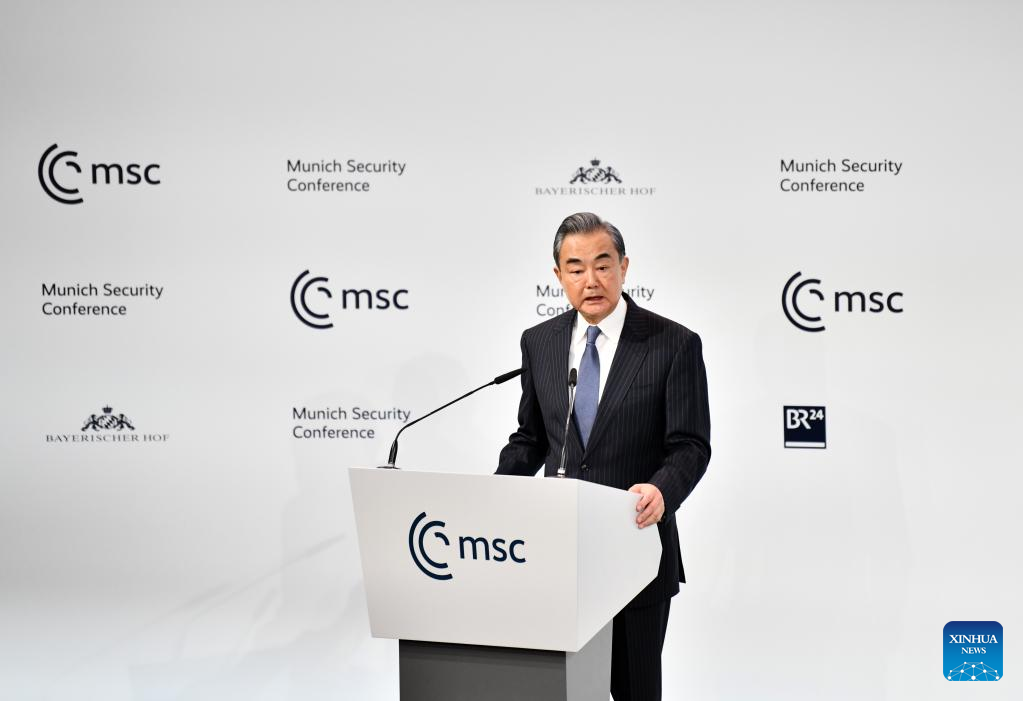
Editor's note: CGTN's First Voice provides instant commentary on breaking stories. The column clarifies emerging issues and better defines the news agenda, offering a Chinese perspective on the latest global events.
On February 18, senior Chinese diplomat Wang Yi, who is also director of the office of the Foreign Affairs Commission of the Communist Party of China Central Committee, met with U.S. Secretary of State Antony Blinken on the sidelines of the 59th Munich Security Conference at the request of the U.S. side. Talking about the so-called airship incident that has been dominating the headlines, Wang urged the U.S. to change its course, and acknowledge and repair the damage that its excessive use of force has caused to China-U.S. relations.
American's "excessive use of force" is the root cause of the recent tension between China and the U.S., but it is by no means the first time it caused problems. Afghanistan, Syria, Iraq and the rest of the Middle East have suffered for decades under America's military intervention and are still spending immeasurable time dealing with its ramifications. As for the U.S., it has spent $2 trillion in Afghanistan alone.
Today, while not directly involved, American political, military and economic forces are deeply enmeshed in the Ukraine conflict. According to Monica Duffy Toft, professor of international politics at Tufts University, the United States approved about $50 billion in aid for Ukraine in 2022. Half of that money went towards military spending. "By itself, I believe the most that military aid can accomplish is to feed a war of attrition," Toft wrote.
In our recent interview with Alfred de Zayas, former UN independent expert on international order, he said that if the U.S. and Germany send fighter planes to Ukraine, the likelihood of a direct Russia-NATO confrontation will be much higher, which would be an apocalyptic scenario.

Wang Yi, a member of the Political Bureau of the Communist Party of China (CPC) Central Committee and director of the Office of the Foreign Affairs Commission of the CPC Central Committee, delivers a keynote speech during the Munich Security Conference in Munich, Germany, Feb. 18, 2023. /Xinhua
Wang Yi, a member of the Political Bureau of the Communist Party of China (CPC) Central Committee and director of the Office of the Foreign Affairs Commission of the CPC Central Committee, delivers a keynote speech during the Munich Security Conference in Munich, Germany, Feb. 18, 2023. /Xinhua
While the United States was busy sending out guns and tanks, its domestic situation exacerbated. In 2022, the United States saw the highest inflation rate in over four decades. Despite the White House's efforts to tamp down speculations about recession by showing off unemployment rates, economists are talking about a possible recession this year. A survey by intelligence company Morning Consult in late January found that 46 percent of American adults think the U.S. is already in one.
Wang Yi told the Munich Security Conference, "We know fully well that development is only possible in a peaceful and tranquil international environment." That doesn't apply just to China, but to the global community that is still trying to get through a massive global pandemic. Prolonged volatility in the international system will not serve anyone's interest.
It might be that the U.S. was carried away by its anti-China sentiment. It might be that the Biden administration wanted to demonstrate toughness just before the State of the Union address. Or it might be that the U.S. tried to distract the public from domestic problems by creating an international tension. Whatever the reason behind the U.S. downing of the Chinese unmanned airship and its subsequent frenzy in shooting down various airborne objects, its proclivity towards violence as a solution to problems is adding more fuel to an already tense world where people are yearning for reconciliation and stability.
"When all countries pursue peaceful development, the future of humanity will be full of promise," Wang Yi said. The United States will also benefit from a world full of promise. It must find a way to seek and bring about peace if it wants to be part of that future.
(If you want to contribute and have specific expertise, please contact us at opinions@cgtn.com. Follow @thouse_opinions on Twitter to discover the latest commentaries in the CGTN Opinion Section.)